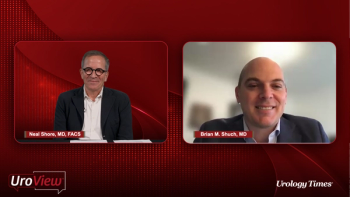
Prostate mpMRI: Ordering, Results Interpretation, and Follow-up Process
An overview of the steps involved in the clinical application of mpMRI imaging, from image generation to results interpretation and follow-up.
Episodes in this series
Dr. Boris Gershman: The workflow for getting a prostate MRI and the time course depends, in part, on the setting in which the provider is practicing and the patient is seeing. Most of the time, the multi-parametric MRI is ordered by the urologist when evaluating the patient for an elevated PSA or an abnormal rectal examination. That study might take a few weeks to a month to schedule, and then there needs to be a follow-up; either a revisit or a telephone conversation between the urologist and the patient to review the results of the MRI and discuss the need for biopsy and next steps. In more uncommon cases, a primary care physician may order the prostate MRI for someone with an elevated PSA before referral to the urologist, and in those cases, the sequence is a little expedited because the urologist already has the results of the MRI during the initial evaluation. Also, in some cases, there might need to be a conversation or discussion between the radiologist who interprets the MRI and the urologist if there are any indeterminate findings, although most of the time the radiologist's report suffices to communicate results and need for biopsy.
What are the most critical considerations for generating, interpreting, and reviewing the MRI results? The single most important factor is the radiologist. Having a high-quality radiology department with good scanners that acquire high-quality images, and radiologists that are sub-specialty trained in interpreting prostate MRIs. In my opinion, is the single most important factor to having high-quality MRI interpretation and results to guide next steps and management. Image quality can vary. We see this for men who obtain an open MRI because of claustrophobia or anxiety or other considerations. The image quality is not as good as on a closed machine in general. And interpretation varies from place to place. Personally, I really trust and have a very close working relationship with our genitourinary radiologists who read our prostate MRIs. And for most outside studies, we will request a review at our institution. In some cases, the review confirms the outside interpretation, but in other cases, they may disagree and say that a suspicious lesion is not actually suspicious and does not meet IRX criteria, or they may identify additional lesions that we are not targeting during MRI targeted biopsy. And so that is the single most important factor in my opinion: Having high-quality radiology acquisition and interpretation for the prostate MRI and building a relationship with radiologists so that you can trust their interpretations, reach out to them if there are any questions or clarifications necessary, especially as this may relate to targeting for prostate biopsy.
Follow up with the radiologists, in terms of direct communication regarding radiology reports, really depends on situation. I would say the vast majority of the time, the radiology report is straightforward and [00:15:00] additional follow up or direct communication via email or phone is not required with the radiologists, at least in my practice. Again, this reflects, in part, that I have a very close working relationship and a high degree of trust in our radiologists, and based on how the report is written, I can usually understand all the information they are trying to communicate.
In cases where there might be indeterminate findings, multiple lesions that may warrant biopsy, or a PI-RADS 3 lesion that, in the radiology report may not appear that suspicious, I may reach out to the radiologist, either via email or via phone, to discuss the results, get a little more collateral information, and help formulate a more accurate plan of care for the patient, based on their level of suspicion.
Newsletter
Stay current with the latest urology news and practice-changing insights — sign up now for the essential updates every urologist needs.



